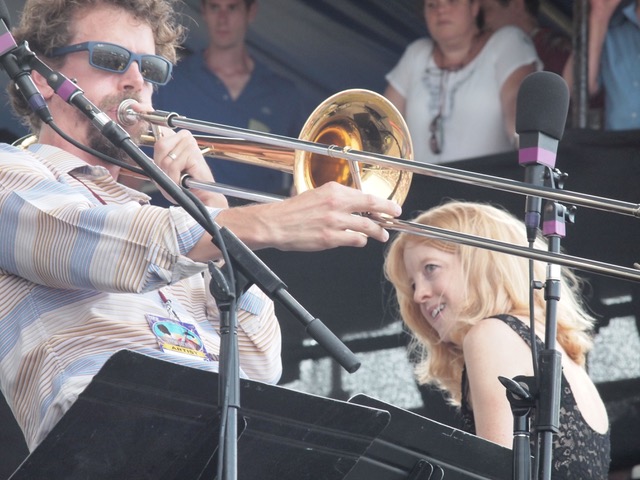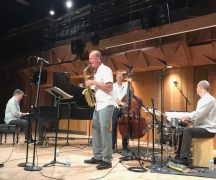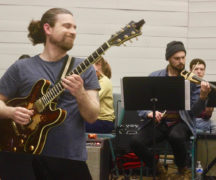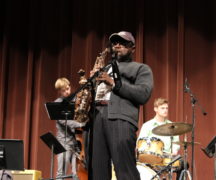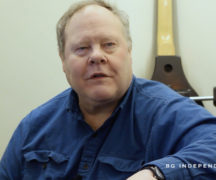By DAVID DUPONT
BG Independent News
Trombonist Ryan Keberle advises shutting the screen off, and just listen to the music.
He listens deeply. With his ears and his whole body, absorbing the rhythm and letting the harmonies resonate through his body.
That’s the message he’ll bring to students in Bowling Green State University’s jazz program when he visits next week. His residency will include a performance with the Jazz Lab Band I on Tuesday, Oct. 5, at 8 p.m. in Kobacker Hall on the BGSU campus.
Keberle said he will work with students “to find that way in to that deep listening, just becoming more in touch with all those details.”
Part of this, he said, is helping “students recognize and understand that what they’re hearing now is not even close to what professional musician or teacher is hearing and help them to find their own way in to that deep listening process.”
He sees one major obstacle to this – YouTube. Ask young musicians, or young people in general, where they listen to music and they’ll often answer YouTube.
The platform, along with other streaming services, is already problematic for musicians because of the way it uses their content without compensation.
“There’s a bigger detriment,” Keberle added. “Everything is accompanied by an image. When you are using your eyes, you’re using your ears in a different way. … They’re constantly visually overstimulated.”
So he has students start by closing their eyes.
Keberle said he was fortunate to have been exposed to this kind of deep listening since childhood. He comes from a musical family – his mother is a piano teacher and his father directs the jazz ensemble at Whitworth University in Spokane, Washington.
He started playing violin at 4 using the Suzuki method that has students learn everything by ear. Shortly afterward he started taking piano lessons with his mother.
When he was 10, and it was time to start a band instrument, his father, a trumpeter, started teaching him trombone. Keberle said his father was always was short of trombonists in his highly regarded college big band. “I think he was grooming me to fill out his section.”
In high school Keberle did play in the ensemble as well as a professional big band in Spokane.
Trombone felt like the most natural instrument to him, though he continues to play piano. He no longer has a violin.
After one year as a double major in music and physics and computer science at Whitworth, he realized he could not devote the energy that would be needed to be successful in both disciplines.
He decided on music and headed east to study at the Manhattan School of Music, and then he earned an artist diploma in the first class in Juilliard’s jazz program.
Those deep listening skills helped him launch a successful freelance career in New York.
Though he graduated in jazz studies, he started out playing music from Columbia, Argentina, and Brazil. Every ethnic group that migrates to New York City brings their own music, and that music merges with American sounds.
“You can’t survive focusing on one genre or one specific style alone,” Keberle said. The exception is someone with a full-time position in an orchestra.
So Keberle, 41, played chamber music, Broadway shows, including “Into the Heights,” big bands, Latin jazz and more. He has performed on seven Grammy-winning albums.
He’s worked with Sufjan Stevens, and on TV and movie soundtracks including “The Marvelous Mrs. Maisel” and the new Aretha Franklin biopic “Respect.”
He’s also a sub on “Saturday Night Live.”
“It’s such an amazing town that offers a plethora of musical options at any moment in time,” he said. “It’s mind blowing.”
He added: “The only reason I was able to move successfully from one genre to the next is because of my ability hear those details. … If you don’t hear the details … you don’t know what to execute on your instrument.”
When jazz is taught properly, it equips the performers with those skills. “Professor (David) Bixler is a perfect person to teach that being an active performer himself,” Keberle said of the director of jazz studies at BGSU.
Keberle is also the director of jazz studies at Hunter College in New York, a position he’s held since he was 24, and he has begun teaching trombone at his alma mater, Manhattan School of Music.
“The jazz language is one of the most sophisticated and diverse languages,” he said. To succeed one has to hear the nuances of swing, timbre, and vibrato.
Keberle said he’s easing up on his freelance work to concentrate on his own projects. The trio Reverso is devoted to exploring the intersection between of classical music and jazz. The quartet Catharsis’ most recent album “Find the Common, Shine the Light” with vocalist Camila Meza addresses the rancor and divisiveness in society.
He does still take “more high profile” jobs, such as “SNL.”
Keberle’s highest profile gig in the jazz world comes from his work with the Maria Schneider Orchestra, an elite ensemble of many of the finest New York jazz musicians.
He was first hired, on the recommendation of bass trombonist George Flynn, for a Midwest tour when the lead trombonist was locked into a Broadway show.
“I went in cold,” Keberle said. The band doesn’t rehearse. “I haven’t been that nervous for any other gig in my life.” Leading up to the tour, he said, “I spent the better part of the month practicing more than I ever practiced in my entire life. Talk about listening to the details, listening to her music over and over, playing along with it and trying to match the way they articulate, the way they phrase, the way they use dynamics, the vibrato in the brass section, all the details.”
In 2007, he became full-time second trombonist, the part that has many of the improvised solos.
BGSU hosted Schneider back in 2018 giving students a chance to play the same charts Keberle plays as a member of the jazz orchestra.
Keberle will bring his own big band music to BGSU. They are arrangements of music from Reverso and Catharsis. “I don’t typically write things with just one project in mind.” He wants to write high quality music that will stand the test of time, and if he has such a piece he sets it for a variety of ensembles.
Playing original music is a particular challenge for students, he said, since they don’t necessarily have access to recordings to listen to. He does send live recordings he’s made to help them get the feel, which is especially important for the rhythm section.
“It’s always exciting for me to hear what young musicians do with the music,” Keberle said, “and to hear their perspective and get their take on it.”

